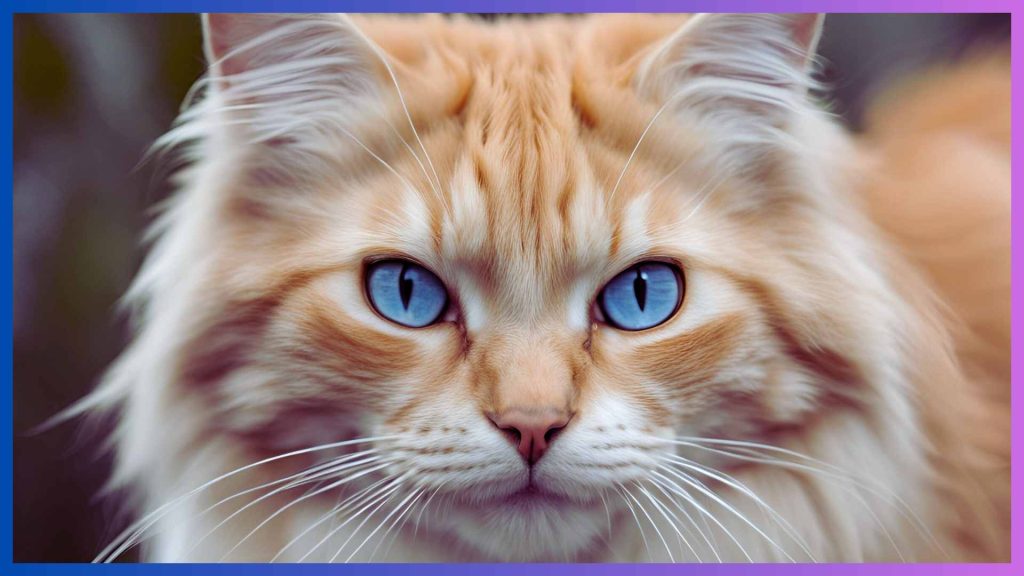Welcoming a cat into your home can be a joy. But for those with allergies, it’s a big decision. If you’re thinking about a Maine Coon cat, you might wonder if they’re safe for your home.
We’ll explore the facts about Maine Coon cats and allergies. This will help you decide if they’re right for you.
Introduction to Maine Coon Cats
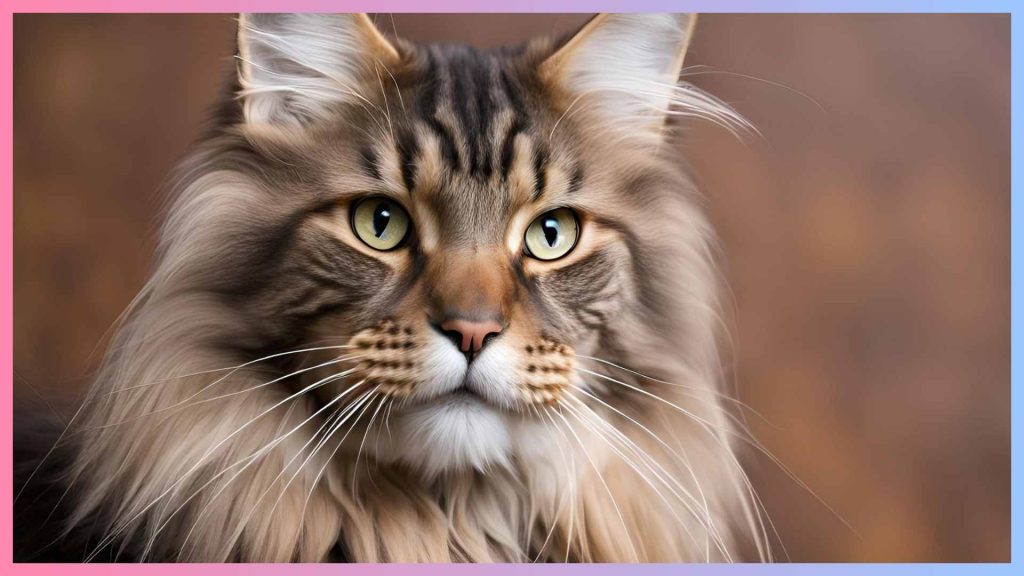
Origin and History
Maine Coon cats have a fascinating history. They’ve been around North America’s coastlines and forests for centuries. They are one of the oldest natural breeds in the United States, with a mysterious past.
It’s believed they came from long-haired cats brought by early European sailors and settlers.
Physical Characteristics
Maine Coons are known for their size and muscular build. Their shaggy coat is water-resistant and keeps them warm. They have a broad chest, strong jaws, and large ears.
Their coat comes in many colors and patterns, making them look regal.
| Characteristic | Statistic |
|---|---|
| Origin | United States |
| Height | 10″ to 16″ |
| Adult Weight | 9 to 20 pounds |
| Life Span | 9 to 15 years |
| Price Range | $400 to $2,000 |
| Affection Level | 100% |
| Activity Level | 50% |
| Pet-Friendly | 80% |
| Kid-Friendly | 100% |
| Sociability | 100% |
| Intelligence | 80% |
| Playfulness | 60% |
| Independence | 30% |
| Vocality | 30% |
| Grooming | 80% |
Maine Coons are among the largest cat breeds and are loved worldwide. They are generally healthy, thanks to careful breeding for genetic conditions.
The Maine Coon breed started in the 1850s in Maine, USA. They were less popular in the early 20th century but gained recognition again in the 1950s. The Central Maine Cat Club was formed in 1953 to protect the breed, and the Maine Coon Cat Club was established in 1973.
Female Maine Coons weigh 12 to 15 pounds, while males can be 18 to 22 pounds or more. They are the oldest natural breed in the US and the official cat of Maine. The longest Maine Coon on record was 48.5 inches.
Maine Coons have a muscular body and a medium-width head. They have large, expressive eyes and long, flowing tails. Their coat is double-layered, silky, and comes in many colors and patterns.
What are Hypoallergenic Cats?
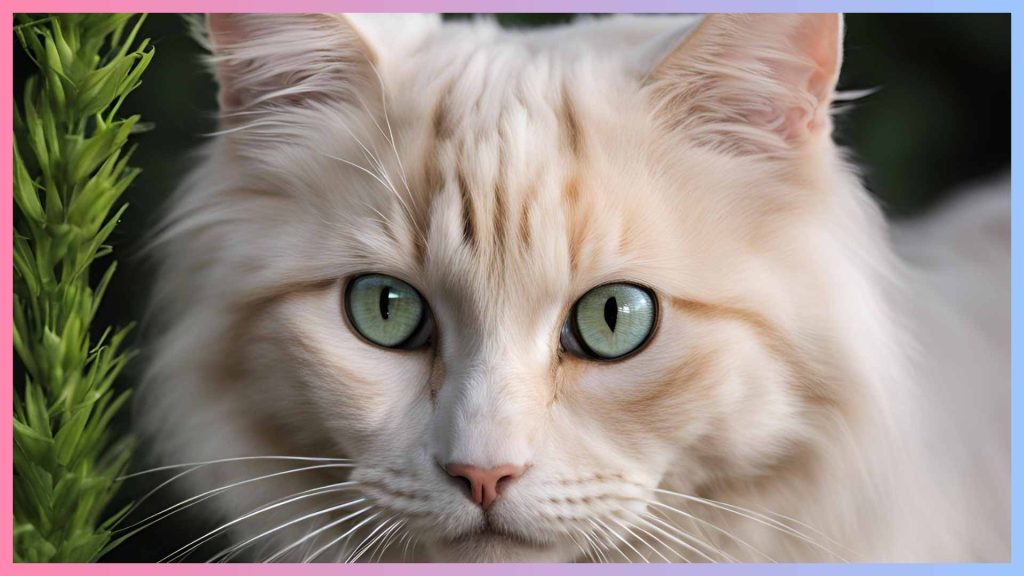
Hypoallergenic cats are special felines that make fewer allergens. These allergens are proteins that can cause allergic reactions in people. Even though no cat is completely free from allergens, some breeds have less of the main allergen, Fel d 1, in their saliva and skin.
Definition and Explanation
Hypoallergenic cats make less of the protein Fel d 1, which causes most cat allergies. This protein is in their saliva, skin, and fur. It spreads around as they groom and shed. Breeds that make less Fel d 1 are better for people with allergies.
How Do Hypoallergenic Cats Differ?
Hypoallergenic cats have special coats and grooming habits. They usually have a single-layer coat, unlike many other cats. This means they shed less hair and dander.
They also groom themselves a lot. This helps them remove extra hair and oils. This reduces the allergens they release into the air.
Some famous hypoallergenic cat breeds are the Sphynx, Russian Blue, and Bengal. Others include the Devon Rex, Cornish Rex, Javanese, Siberian, Balinese, and Oriental Shorthair. But breeds like Persian, Maine Coon, and Siamese are not hypoallergenic.
The Allergy Issue
Maine Coon cats are loved for their looks and friendly nature. But, many wonder if they are hypoallergenic. The main cause of cat allergies is Fel d 1 protein found in cat saliva, skin, and urine. When cats groom, they spread this protein on their fur, making it airborne and causing allergies in humans.
What Causes Allergies in Cats?
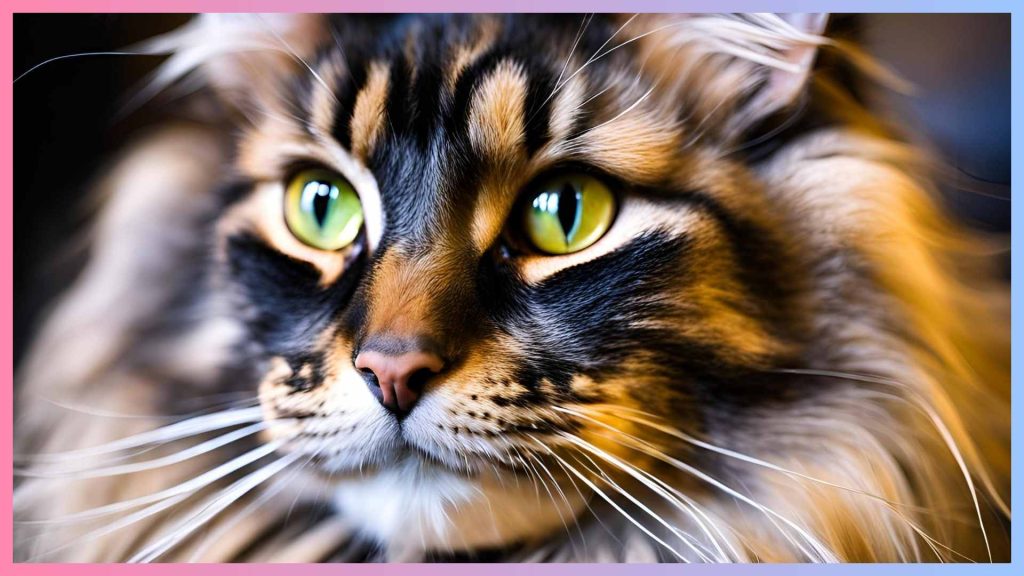
Maine Coon cats, like most cats, have Fel d 1 protein. Their long fur also means more shedding and allergens at home.
Common Allergy Symptoms
- Itching
- Sneezing
- Congestion
- Runny eyes
- Asthma attacks
How bad these symptoms are can vary a lot. Some people might find Maine Coons easier to be around than other cats. But, Maine Coons are not truly hypoallergenic. Those with severe allergies might still react strongly.
| Allergen | Source | Impact on Allergies |
|---|---|---|
| Fel d 1 Protein | Saliva, Skin, Urine | Primary trigger for cat allergies |
| Cat Dander | Shed Skin Cells | Contributes to airborne allergens |
| Thick Fur Coat | Maine Coon Breed | Increased shedding and accumulation of allergens |
Are Maine Coons Hypoallergenic?
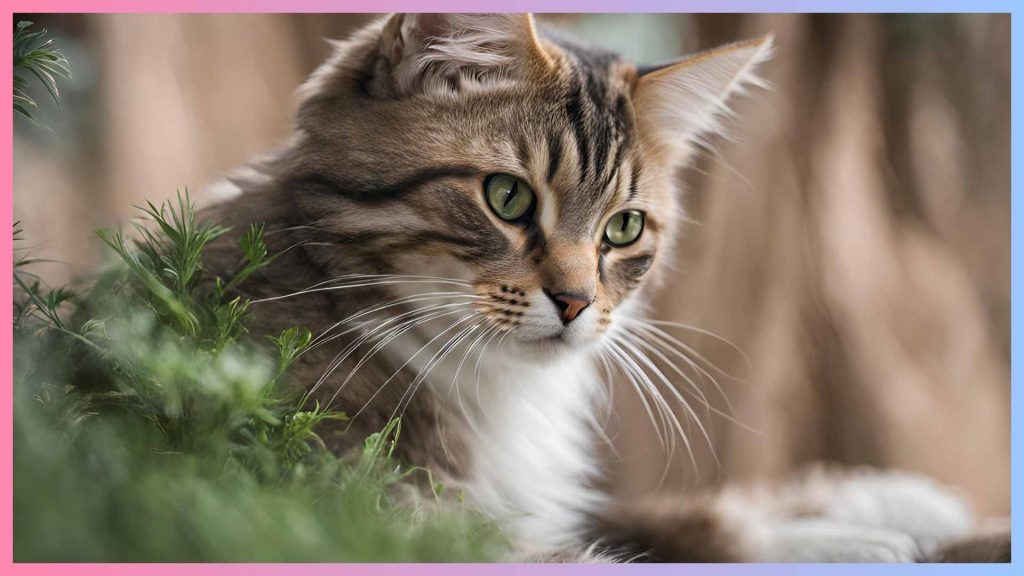
Thinking about getting a Maine Coon cat? You might wonder if they’re hypoallergenic. Sadly, the answer is no. Maine Coons, like many cats, have the Fel d 1 protein. This protein is the main allergen that causes allergic reactions in people.
Also, Maine Coons have thick, long fur that sheds a lot. This makes more allergens spread around your home. While some people with mild allergies might do okay, Maine Coons aren’t a good choice for those with severe allergies.
| Characteristic | Rating |
|---|---|
| Hypoallergenic | No |
| Allergen Production | Moderate to High |
| Shedding | High |
No cat breed is truly hypoallergenic, as all cats make some Fel d 1 protein. But, some breeds like the Sphynx, Devon Rex, and Russian Blue make less. These might be better for those with severe allergies.
If you have maine coon allergies or worry about maine coon dander production, think carefully before getting a Maine Coon. Grooming, cleaning, and air purifiers can help. But, you might need allergy meds, treatments, or see an allergist for severe are maine coons hypoallergenic reactions.
Maine Coon Allergy Facts
Maine Coons are often thought to be hypoallergenic. But, they still shed and release the Fel d 1 protein. This protein can cause allergic reactions in many people.
Do Maine Coons Produce Less Dander?
Maine Coons don’t produce less dander than other cats. Their big size and fluffy fur spread more dander around. Regular grooming can help, but they still shed and release allergy-causing proteins.
The Role of Fel d 1 Protein
The Fel d 1 protein is found in all cats’ saliva and skin. It’s the main reason for cat allergies. When Maine Coons groom or shed, these proteins become airborne. They can be inhaled by humans, causing allergic reactions.
Some people might find Maine Coons easier to tolerate than other breeds. But, it’s key to remember that no cat is 100% hypoallergenic. To live with a Maine Coon, you need to take steps to manage allergens.
| Breed | Fel d 1 Protein Levels | Allergy-Friendliness |
|---|---|---|
| Maine Coon | Moderate | Moderately Allergy-Friendly |
| Siberian | Low | Highly Allergy-Friendly |
| Balinese | Low | Highly Allergy-Friendly |
| Russian Blue | Low | Highly Allergy-Friendly |
Breeding and Genetics
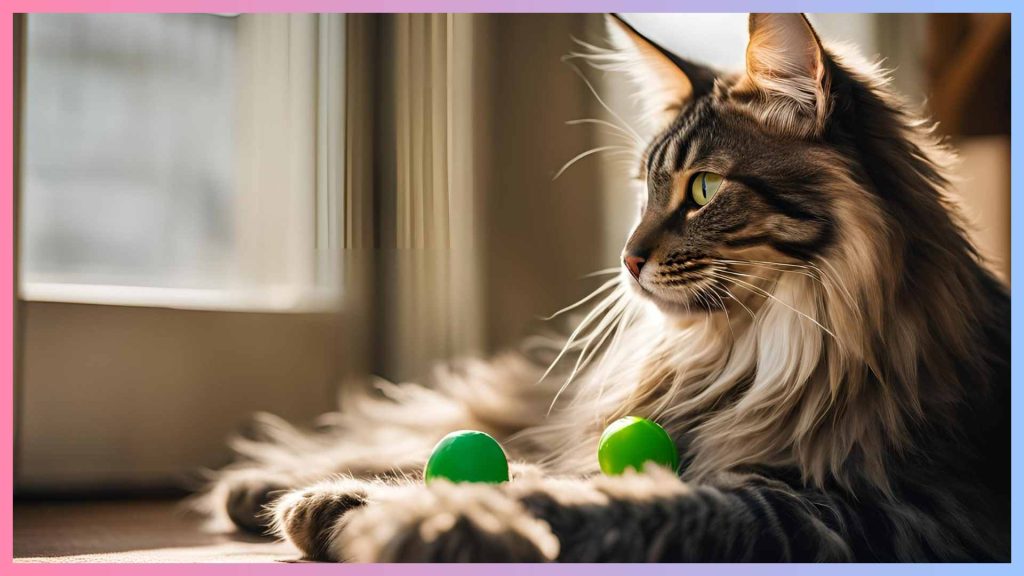
When it comes to Maine Coon cats and allergies, breeding matters a lot. Not all breeders focus on making cats less allergenic. But, some are working on it, aiming for cats that are better for people with allergies.
The Impact of Breeding on Allergy-Friendliness
Genetics, like how much Fel d 1 protein a cat makes, affect allergies. Cats with less Fel d 1 and shorter, smoother coats might be better for people with allergies. Knowing this can help you pick a Maine Coon that’s more allergy-friendly.
Genetic Factors Influencing Allergy Response
Some breeders are using hypoallergenic cat breeding to make Maine Coons less likely to cause allergies. They focus on cat allergy genetics and fel d 1 protein levels. Their goal is to create Maine Coons with maine coon coat type and allergies that are safe for those with allergies.
“Understanding the genetic factors that influence a Maine Coon’s allergy-triggering potential can help you find a cat that is a better fit for your household.”
Living with a Maine Coon
Maine Coons may not be hypoallergenic, but you can still manage allergies. By using smart strategies and adjusting your home, you can live comfortably with your Maine Coon. This makes your space better for both you and your pet.
Tips for Minimizing Allergies
- Embrace regular grooming: Brush your Maine Coon’s coat several times a week. This helps remove loose fur and dander, reducing allergens in your home.
- Invest in a high-quality air purifier: Choose models with HEPA filters. They can capture and remove airborne allergens, including Fel d 1 protein.
- Consider allergy medications: Talk to your healthcare provider about medications. They can help manage your symptoms and make life with your Maine Coon easier.
Creating an Allergy-Friendly Environment
To make your home allergy-friendly for your Maine Coon, follow these steps:
- Replace carpets and rugs with hardwood, tile, or laminate flooring. These surfaces are easier to clean and keep free of allergens.
- Use allergen-proof bedding and wash it often in hot water. This eliminates trapped dander or hair.
- Regularly wash your cat’s toys, beds, and other items. This reduces allergen buildup.
- Set up cat-free zones in your home, like the bedroom. This limits your exposure to allergens.
By following these tips, you can make your home more allergy-friendly. This way, you can enjoy your Maine Coon’s company more comfortably. Remember, everyone reacts differently to allergens. Be ready to adjust your approach as needed to find what works best for you.
Conclusion
Maine Coons are not hypoallergenic, but you can still live with them if you have allergies. Knowing about cat allergies and the Fel d 1 protein helps. This knowledge lets you reduce allergens and live peacefully with your Maine Coon.
Maine Coons have beautiful, thick fur, but it sheds a lot. Their saliva also has the Fel d 1 protein, which can cause allergies. Still, with regular grooming, cleaning, and air purifiers, you can manage these issues. This way, you can enjoy your Maine Coon’s company.
Deciding to get a Maine Coon requires thinking about your allergies and how to handle them. By learning about Maine Coon allergies and taking steps to prevent them, you can make a happy home. This is where you and your Maine Coon can both be happy and healthy.
FAQ
Q: Are Maine Coons hypoallergenic?
A: No, Maine Coons are not hypoallergenic. They produce the Fel d 1 protein, which causes allergic reactions. Their long fur also leads to more shedding, spreading allergens around the house.
Q: What makes a cat hypoallergenic?
A: Hypoallergenic cats make fewer allergens. They have less Fel d 1 protein in their saliva and skin. They also shed less, which means fewer dander particles in the air.
Q: What are the common allergy symptoms caused by Maine Coons?
A: Being around Maine Coons can lead to itching, sneezing, and congestion. You might also have runny eyes or asthma attacks. How bad these symptoms are can vary a lot from person to person.
Q: Can breeding affect a Maine Coon’s allergy-friendliness?
A: Yes, breeding can make Maine Coons more or less likely to cause allergies. Cats with less Fel d 1 protein and shorter coats might be better for people with allergies. Some breeders are working to make these cats more allergy-friendly.
Q: How can I create an allergy-friendly environment for living with a Maine Coon?
A: To make living with a Maine Coon easier for allergies, groom them regularly to cut down on shedding. Vacuum and dust often to get rid of allergens. Using HEPA air purifiers can also help.
Consider removing carpets and rugs, and use allergen-proof bedding. Washing your cat’s toys often can also make your home more comfortable.

